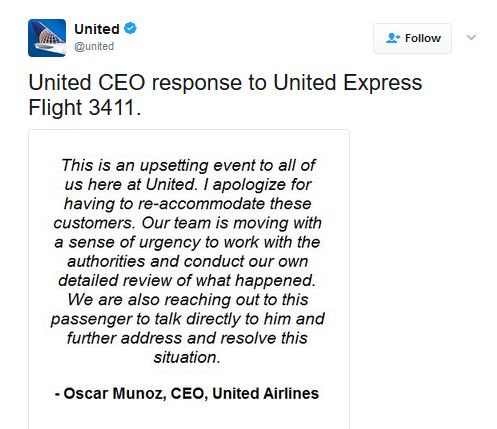Guy Higgins On: United Airlines Flight 3411
On April 9, 2017, United Airlines flight 3411 from Chicago to Louisville, KY, was fully boarded when a United flight crew approached the gate and requested seats to Louisville so that they could fly, as flight crew, for a scheduled United flight departing Louisville. This is a fairly routine situation. Flight crews are flown by their airline to accommodate airline schedules. United had a procedure in place for exactly this situation. To quote The Bard, “Therein hangs a tale.”
Let’s capture the situation:
- United had a flight (3411) scheduled to depart Chicago for Louisville, KY. It was sold out and all passengers were onboard.
- A United crew scheduled to fly a regularly scheduled flight from Louisville showed up at the gate after all passengers were onboard the airplane and seated.
- United had a problem – the airline needed to get the flight crew to Louisville to crew the Louisville flight, but there were no seats available on the flight that the crew had planned to take (3411).
- United applied proven techniques:
- They asked for volunteers to give up their seat and take a later flight and receive compensation (normally a voucher of some value for a future flight).
- When no one volunteered, United upped the value of the voucher.
- Eventually, when no one was willing to give up their seat and fly to Louisville the next day (which was the next United flight to Louisville), United randomly chose passengers to involuntarily give up their seats.
- One passenger refused to involuntarily give up his seat, claiming that, as a doctor, he had a hard commitment at his hospital the next morning.
- United called the airport police and had the man forcibly removed from the airplane – complete with lots and lots of smart phone videographers recording the event.
- The event, surprising no one, made the news.
- The United CEO sent a memo to United employees praising them for adhering to United procedures.
- The CEO’s memo was made public (again, surprising no one).
- The CEO apologized to the man removed from the flight.
- The CEO apologized to all the passengers on flight 3411.
- In desperate need to fill airtime in the 24-hour news shows, every step of this was given nationwide reporting.
- United stock lost about $250 million in trading on the stock market (note: the airline didn’t lose any money because United doesn’t own its own stock – the unions and retirement accounts with United stock might have taken a loss if they sold stock while the price was dropping – I’m including this only because the talking heads on TV seem to think that this was punishing United. It wasn’t.)
- United reimbursed all the passengers on flight 3411.
- Flight 3411 was the topic of innumerable Op-Ed pieces and even earned its own article in Aviation Week magazine.
- The passenger dragged from the airplane filed a lawsuit against United.
So, what are the various morals to this tale?
United Airlines is a business. Its primary goal is to stay in business, which is much harder than one might think for the airline business. It is vitally important that United satisfy their customers to encourage them to fly United Airlines in the future and so that United maintains a reputation on a par with its competitors. In the vast majority of cases, the guidance that United provided for its employees works just fine. People are often happy to accept a voucher for a couple of hundred dollars and catch the next flight. That didn’t happen and United found itself in a crisis.
It seems that United had not planned for a crisis such as this one. That means, at least to me, that the senior leadership at United hadn’t thought through the various possible scenarios in the event that the United employees were forced ask customers to involuntarily leave their seat on the airplane. I’m reminded of the quip, “So, Coach Hayes, (Woody Hayes of Ohio State who famously preferred running the football), why don’t you pass the ball more?” And Woody responds, “There are only four things that can happen when you throw the ball – and three of them are bad.” United was faced with a very limited set of choices and most of them were bad.
- They could have forcibly removed the passenger (which they did).
- They could have accepted the passenger’s refusal in which case all the involuntarily removed passengers would have refused.
- They could have not accommodated the flight crew in which case the scheduled flight from Louisville would probably have been cancelled.
- They could have refused to take off until they had the requisite number of volunteers.
- They could have quietly made the involuntarily removed passengers “offers they couldn’t refuse” such as (and I am making this up):
- A full refund of their airfare.
- A first class seat on the next flight (on any airline) to Louisville.
- A $250 cash “apology” for their trouble.
- A posh suite at the airport hotel and a first class dinner if the next flight was not until the following day.
None of these options are terribly appealing, but the last one, while a bit expensive seems to be a whole lot cheaper than the price that United will eventually pay for this learning opportunity.
But, the tale is not yet done hanging. After United mishandled the crisis at the gate, the CEO created a second crisis by responding inappropriately to the initial crisis. The problems and ensuing crisis were the fault of United leadership for not having plans in place to 1) deal with this kind of problem and 2) communicate effectively to both United employees and United customers.
It seems to me that United should have had:
- A strategy in place that empowered the gate agents to quietly and privately make outrageous offers to encourage people to give up their seats. Even if it cost United $10,000 ($2,500 for each of the four seats I’m assuming United needed to find for the Louisville flight crew), that pales in comparison to the cost of cancelling the Louisville flight and the ultimate costs to brand and reputation that will result from the flight 3411 fiasco.
- A crisis management plan that got senior (or at least more senior) leadership involved in deciding how to manage the crisis.
- A crisis communication plan with message maps all thought out guiding communications throughout the crisis – communications with all the stakeholders.
Crises frequently present opportunities. United could have saved the hit to their reputation by handling this situation with tact and attention to their customers. Instead, they tarnished that reputation, and that will likely cost United much more than any offer to the involuntarily displaced passengers.
The key remains to Predict.Plan.Perform.
 “What should we do now?” “What should we say?”
“What should we do now?” “What should we say?”